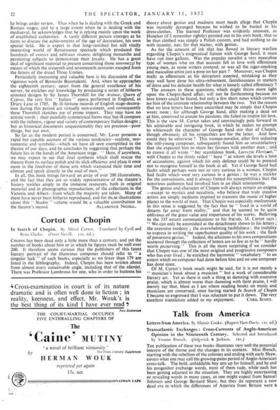Cortot on Chopin
In Search of Chopin. By Alfred Cortot. Translated by Cyril and
Rena Clarke. (Peter Nevill. i2s. 6d.)
CHOPIN has been dead only a little more than a century, and yet the number of books about him or in which he figures must be well over 200. It therefore seems curious that the publishers of this latest literary portrait of the illustrious composer should refer to " a singular lack " of such books, especially as no fewer than 179 are listed in the bibliography. Indeed, Chopin has been written about from almost every conceivable angle, including that of the alienist. There was Professor Lombroso for one, who in order to buttress his theory about genius and madness must needs allege that Chopin was mentally deranged because he wished to be buried in his dress-clothes. The learned Professor was evidently unaware, as Huneker (if I remember rightly) pointed out in his own book, that to be thus clothed was simply a Polish custom, and had nothing to do with insanity, nor, for that matter, with genius. As for the amount of ink that has flowed in literary warfare regarding Chopin's enigmatical liaison with George Sand, it must have run into gallons. Was the popular novelist a very masculine type of woman who on that account fell in love with effeminate young men, as some writers contend, or was all the cigar-smoking and masculine attire just a pose on her part ? Moreover, was Chopin really as effeminate as his detractors asserted, mistaking as they may well have done his ultra-refinement, fastidiousness in matters of dress and his delicate health for what is loosely called effeminacy ?
The answers to these questions, which might throw more light upon the Chopin-Sand affair, will not be forthcoming because no love letters could be found, but only a few short notes which contain no hint of the intimate relationship between the two. Yet the reason that no love letters have been unearthed may be simply that Chopin wrote none ; for although George Sand, after making a dead set at him, contrived to arouse his passions, she failed to inspire his love. This is the view M. Cortot takes and convincingly puts forward in his admirable and intriguing book, in which he makes no attempt to whitewash the character of George Sand nor that of Chopin, though obviously all his sympathies are for the latter. And how could they be otherwise ? This woman-novelist, after first seducing the still-young composer, subsequently found him so unsatisfactory that she expected him to share her favours with another man ; and to crown it all wrote " her scandalous book, Lucrezia Florizani," with Chopin as the thinly veiled" hero "at whom she levels a host of accusations, against which his only defence could be to pretend not to recognise himself in the book at all. Yet if George Sand had faults which perhaps were not so very curious in a woman, Chopin had faults which were very curious in a genius ; he was a stickler for the conventions, and it always fretted his susceptibilities that the notorious authoress had involved' him in an illicit relationship.
The genius and Character of Chopin will always remain an enigma —except to mystics and occultists, who believe that truly creative artists are simply mediums inspired to transmit the music of higher planes to the world of man. That Chopin was especially mediumistic in this sense is suggested by the fact that he " lived in a world of dreams far away from reality," and that he seemed to be quite oblivious of the great value and importance of his works. Referring to the 337 extant communications to his friends, M. Cortot says : " We can only be astonished at the detachment shown in his letters ; the excessive modesty ; the overwhelming bashfulness ; the inability to express in writing the superhuman quality of his work ; the flash of possessive genius." Indeed, the allusions to his own compositions scattered through the collection of letters are so few as to be" hardly worth preserving." This is all the more surprising if we consider that Chopin was one of the most original and progressive composers who has ever lived ; he enriched the harmonic" vocabulary "to an extent which no composer had done before him and no one composer has done since.
Of M. Cortot's book much might be said, for it is not merely a " musician's book about a musician" but a work of considerable literary art. Yet as there is such a thing as damning with excessive praise, which is almost worse than damning with faint praise, I will merely say that, blasé as I am where reading books on music and musicians are concerned, once having started In Search of Chopin I became so engrossed that I was reluctant to put it down. The very excellent translation added to my enjoyment. CYRIL SCOTT.


































 Previous page
Previous page